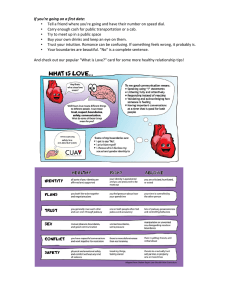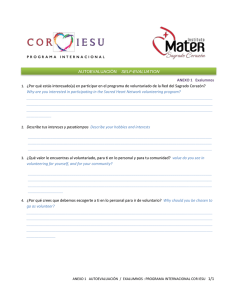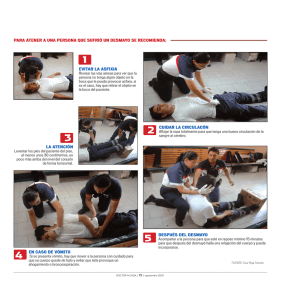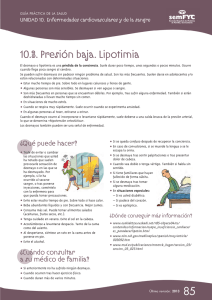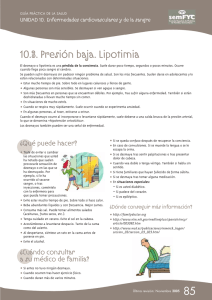PE2238S Common Fainting Spells (Vasovagal Syncope)
Anuncio
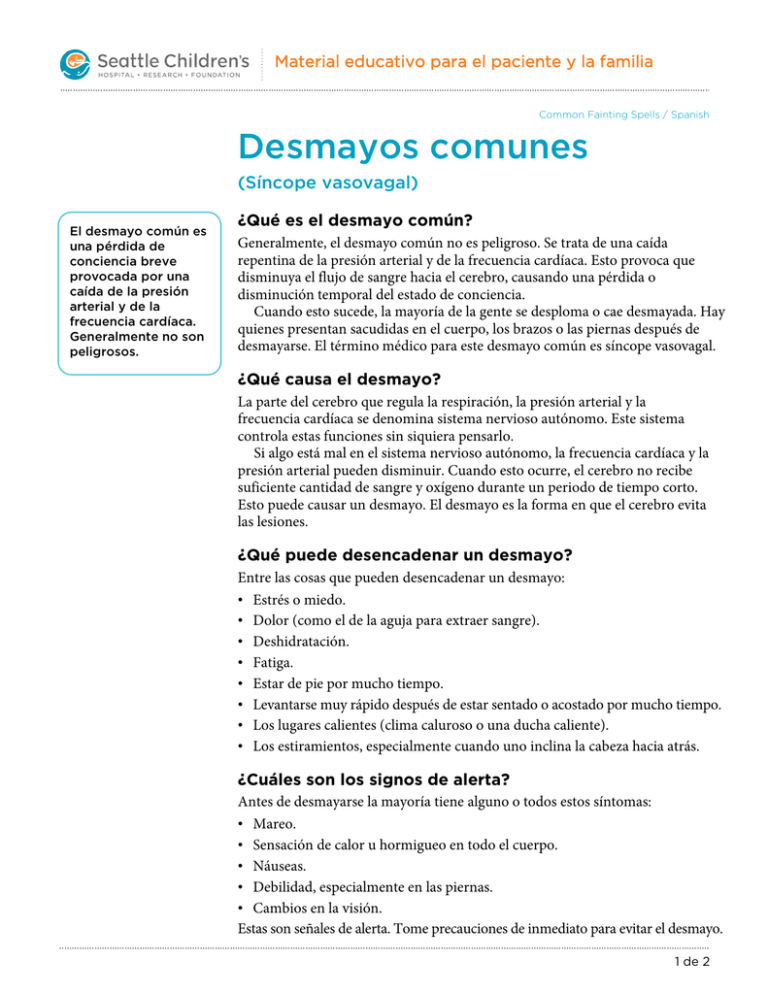
Material educativo para el paciente y la familia Common Fainting Spells / Spanish Desmayos comunes (Síncope vasovagal) El desmayo común es una pérdida de conciencia breve provocada por una caída de la presión arterial y de la frecuencia cardíaca. Generalmente no son peligrosos. ¿Qué es el desmayo común? Generalmente, el desmayo común no es peligroso. Se trata de una caída repentina de la presión arterial y de la frecuencia cardíaca. Esto provoca que disminuya el flujo de sangre hacia el cerebro, causando una pérdida o disminución temporal del estado de conciencia. Cuando esto sucede, la mayoría de la gente se desploma o cae desmayada. Hay quienes presentan sacudidas en el cuerpo, los brazos o las piernas después de desmayarse. El término médico para este desmayo común es síncope vasovagal. ¿Qué causa el desmayo? La parte del cerebro que regula la respiración, la presión arterial y la frecuencia cardíaca se denomina sistema nervioso autónomo. Este sistema controla estas funciones sin siquiera pensarlo. Si algo está mal en el sistema nervioso autónomo, la frecuencia cardíaca y la presión arterial pueden disminuir. Cuando esto ocurre, el cerebro no recibe suficiente cantidad de sangre y oxígeno durante un periodo de tiempo corto. Esto puede causar un desmayo. El desmayo es la forma en que el cerebro evita las lesiones. ¿Qué puede desencadenar un desmayo? Entre las cosas que pueden desencadenar un desmayo: • Estrés o miedo. • Dolor (como el de la aguja para extraer sangre). • Deshidratación. • Fatiga. • Estar de pie por mucho tiempo. • Levantarse muy rápido después de estar sentado o acostado por mucho tiempo. • Los lugares calientes (clima caluroso o una ducha caliente). • Los estiramientos, especialmente cuando uno inclina la cabeza hacia atrás. ¿Cuáles son los signos de alerta? Antes de desmayarse la mayoría tiene alguno o todos estos síntomas: • Mareo. • Sensación de calor u hormigueo en todo el cuerpo. • Náuseas. • Debilidad, especialmente en las piernas. • Cambios en la visión. Estas son señales de alerta. Tome precauciones de inmediato para evitar el desmayo. 1 de 2 El desmayo común (síncope vasovagal) Para más información • Cardiología 206-987-2015 • Consulte con el proveedor de atención médica de su hijo • www.seattlechildrens.org Servicio gratuito de interpretación • En el hospital, solicítelo a la enfermera. • Fuera del hospital, llame a la línea gratuita de interpretación: 1-866-583-1527. Dígale al intérprete el nombre de la persona o la extensión que necesita. ¿Cómo evitar un desmayo? Cuando se reconocen las señales de alerta hay que actuar con rapidez: • Acuéstese, si es posible. • Si está sentado y no se puede acostar, debe inclinarse hacia adelante y poner la cabeza entre las rodillas. • Si está parado y no se puede sentar ni acostar, debe doblar las rodillas o ponerse en cuclillas para aumentar el flujo de sangre a la parte superior del cuerpo. • Beba mucho líquido. Beber ayudará a mantener el volumen sanguíneo. Lo mejor es el agua o las bebidas deportivas como Gatorade. No se recomiendan las sodas porque pueden producir más deshidratación. • Beba más agua mientras hace ejercicio o en climas cálidos. • Preste atención al color de la orina. Debe ser clara, no amarilla ni oscura. Si no es clara, la persona se está deshidratando y debe beber más líquido. • Coma algo salado como pretzels, palomitas de maíz, cacahuates o encurtidos (pickles). • Cambie lentamente de posición; de sentado a parado. • Si está de pie, muévase todo el tiempo para no permanecer en la misma posición por mucho tiempo. Normalmente, estas cosas pueden evitar el desmayo. Los síntomas y signos de alerta pueden continuar pero actuando enseguida se puede evitar. ¿Qué debo hacer si me desmayo? • Si uno se desmaya, es mejor quedarse acostado por un tiempo para que el cuerpo se recupere. No trate de sentarse ni pararse enseguida. El cuerpo necesita tiempo para recuperarse o puede haber otro desmayo. Cuando esté listo, siéntese lentamente y deje que el cuerpo se acostumbre antes de pararse. • Generalmente no se necesitan medicamentos o pruebas médicas para el desmayo común. • Si los desmayos continúan llame al proveedor de médico para ver si necesita ver a un especialista. • Si el desmayo ocurre durante el ejercicio o actividad física llame a su proveedor de atención médica inmediatamente. Esto puede ser señal de otra cosa y puede necesitar atención médica. Seattle Children's ofrece servicio gratuito de interpretación para pacientes, familiares y representantes legales sordos, con problemas de audición o con inglés limitado. Seattle Children's tendrá disponible esta información en formatos alternativos bajo solicitud. Llame al Centro de Recursos para Familias al 206-987-2201. Esta información ha sido revisada por personal clínico de Seattle Children's. Sin embargo, como las necesidades de su niño son únicas, antes de actuar o depender de esta información, por favor consulte con el médico de su hijo. © 2015 Seattle Children’s, Seattle, Washington. Todos los derechos reservados. Cardiología 10/15 Tr (jw/lv) PE2238S 2 de 2 Patient and Family Education Common Fainting Spells (Vasovagal Syncope) Common fainting spells are short losses of consciousness caused by a drop in blood pressure and heart rate. They are usually not dangerous. What are common fainting spells? Common fainting spells are not usually dangerous. They are a sudden drop in blood pressure and heart rate. This causes blood flow to the brain to decrease, causing a temporary loss or decrease in consciousness. When this happens, most people will slump over or fall. Some people have a few jerks of their body, arms or legs after falling. The medical term for common fainting spells is vasovagal syncope (vae-zo-VA-gal SYNC-KA-pee). What causes a fainting spell? The system in the brain that regulates breathing, blood pressure and heart rate is called the autonomic nervous system. This system controls these functions without you even having to think about it. If something goes wrong with the autonomic nervous system, your heart rate and blood pressure can decrease. When this happens, your brain does not get enough blood flow and oxygen for a short period. This can cause you to faint. Fainting is the brain’s way of preventing itself from being damaged. What can trigger an episode? Things that can trigger fainting include: • • • • • • • • Stress or fear Pain (like a needle poke from a blood draw) Dehydration Fatigue Standing for long periods of time Standing up too quickly after sitting or lying down for long periods of time Being in warm environments (like hot weather or a hot shower) Stretching, especially while tilting the head back What are the warning signs? Before fainting, most people have some or all of these symptoms: • Dizziness • Warmth or tingling over the whole body • Nausea • Weakness, especially in the legs • Vision changes If you start having these symptoms, it is a warning sign and you need to take action right away to prevent fainting. 1 of 2 Common Fainting Spells (Vasovagal Syncope) To Learn More • Heart Center 206-987-2015 • Ask your child’s healthcare provider • www.seattlechildrens.org Free Interpreter Services • In the hospital, ask your child’s nurse. • From outside the hospital, call the toll-free Family Interpreting Line 1-866-583-1527. Tell the interpreter the name or extension you need. How can I prevent fainting? When you recognize the symptoms and warning signs, take action fast: • Lay flat, if at all possible • If you are sitting and are not able to lie down, bend over and put your head between your knees. • If you are standing and cannot sit or lay down, bend your knees or squat to increase blood flow to your upper body. • Drink a lot of fluid. Drinking will help to maintain your blood volume. Water or sports drinks, such as Gatorade are best. Soda is not recommended and can actually dehydrate you more. • Drink water more often if exercising or in warm weather. • Check your urine color. It should be clear, not yellow or dark. If it is not clear, you are becoming dehydrated and should drink more liquid. • Eat a salty snack, like pretzels, popcorn, peanuts or pickles. • Change positions slowly. Get up slowly from a sitting to standing position. • Move around when you are standing so that you do not stay in one position for a long period of time. Usually these steps can prevent fainting. The symptoms and warning signs may still happen, but these should prevent fainting if you take action early. What should I do if I faint? • If you faint, stay lying down for a while so your body can recover. Do not try to sit or stand up right away. Your body needs time to recover or you will faint again. When you feel ready, slowly sit up and let your body adjust before you stand up. • People do not usually need medicine or medical tests for common fainting spells. • If you continue to faint, call your healthcare provider. They will help decide if medicine, medical tests or a referral to a specialist is needed. • If you pass out during exercise or physical activity, call your healthcare provider immediately. This can be a sign of something else and further medical attention may be needed. Seattle Children’s offers interpreter services for Deaf, hard of hearing or non-English speaking patients, family members and legal representatives free of charge. Seattle Children’s will make this information available in alternate formats upon request. Call the Family Resource Center at 206-987-2201. This handout has been reviewed by clinical staff at Seattle Children’s. However, your child’s needs are unique. Before you act or rely upon this information, please talk with your child’s healthcare provider. © 2015 Seattle Children’s, Seattle, Washington. All rights reserved. 10/15 PE2238 Heart Center 2 of 2
